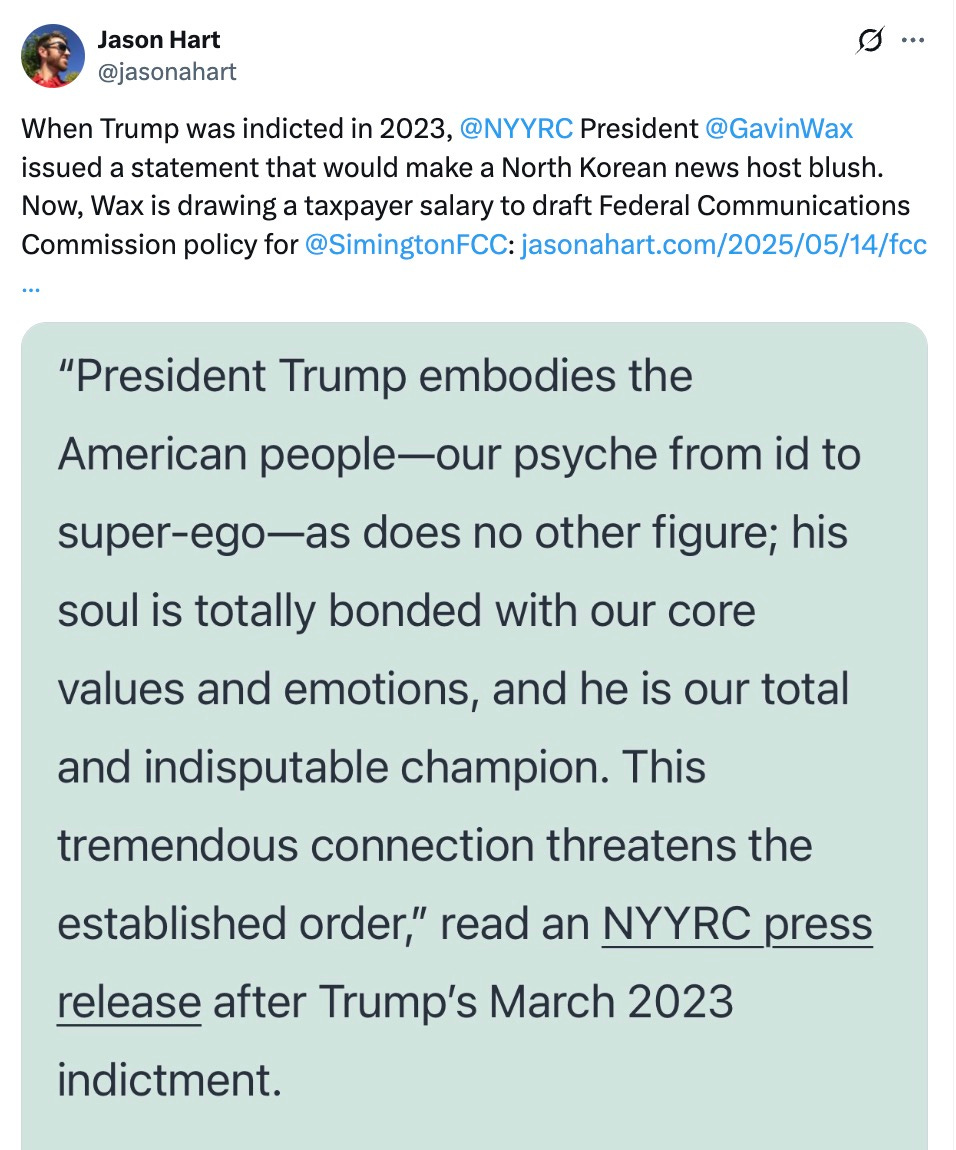
My Grandfather Resisted the Nakba. It Still Isn’t Over.
May 15, 2025
RFK Jr’s Plan to Dismantle Support for Americans With Autism
May 15, 2025Programming note at the jump: Tonight, The Bulwark will host an emergency briefing on the major changes to our nation’s healthcare system that Trump and his Republican allies are trying to push forward this week. Our own Jonathan Cohn—one of the best healthcare reporters in the business—will share his analysis and reporting and take your questions too.
The briefing is exclusively for Bulwark+ members. Upgrade today and join us tonight. You won’t want to miss it.
Happy Thursday.
by William Kristol
Yesterday, Speaker of the House Mike Johnson defended President Trump against charges of wrongdoing by arguing that it was fine, because he was doing it all out in the open.
The reason that many people refer to the Bidens as the ‘Biden crime family’ is because they were doing all this stuff behind curtains, in the back rooms. They were trying to conceal it. . . Whatever President Trump is doing is out in the open. They’re not trying to conceal anything. . . . President Trump has had nothing to hide. He’s very up front about it.
This defense is an admission. Johnson is correct that Donald Trump’s open corruption and lawlessness is fundamentally different from run-of-the-mill corruption and furtive law-breaking. The difference is that it is far more dangerous.
After all, if you live in a nation where you expect laws and rules are mostly going to be enforced, you’ll do your unlawful things in private. And you’ll cover up what you’ve done. You’ll behave like Richard Nixon.
But if you’re bolder than Nixon, if you think you can get away with more than Nixon did or more than Nixon even wanted to do, then you’re not going to bother with a little surreptitious law-breaking and a subsequent cover-up. You’ll test the limits of impunity.
Nixon was a dodgy character operating within a rule-of-law setting. That’s why Nixon was “Tricky Dick.” Trump’s not a particularly tricky politician. He’s much more like a crime boss. And he understands that you’re more powerful the more your criminality can afford to be demonstrated to others.
After all, a mob boss needs shopkeepers to see that they need to pay him protection money. A gangster needs it to be known that if you cross him, you’ll pay a price.
So if such a politician wants not just a bribe or two but a cascade of bribes, he has to let people know that he welcomes bribes, and that everyone is expected to offer bribes. Everyone also has to understand that they can get away with the bribes and benefit from them, and conversely that they’ll pay a price if they don’t step up.
And if you’re not just a mob boss but also the leader of an authoritarian movement, corruption is just part of the story. If you’re interested in autocracy and not just kleptocracy, if you’d like to replace the rule of law with your own personal rule and also to liberate your followers from the rule of law, then your ambitions are even greater.
An authoritarian project has to come out of the shadows to really succeed. The ultimate intimidation of many depends on some early and well-publicized assaults against a few. The harassment of individuals at the border, the assault on some universities and law firms, the targeting of some opposition figures—all of these acts need to be public and publicized to have the desired effect.
So the authoritarian wants people to understand that the Department of Justice is not operating under traditional norms and constraints, that it’s now more a department of political favors and retribution than one of justice and law. The authoritarian wants opponents and friends to know that political adversaries have been targeted.
His lawyers can’t say that in court, so an authoritarian has to straddle two worlds for a period of time. They use the legal system on the way to subverting it. The necessity of deception for at least a while is in tension with the desirability of publicity, and so clever sophistry is their halfway house on the way to brazen openness.
But in any case losing a few court cases to courts operating under the old rules is a small price to pay for progress in subverting those rules. Authoritarians want people to see their authoritarianism in action. Yesterday two members of Trump’s Cabinet, Kristi Noem and Roberty F. Kennedy Jr., testified before Congress. They didn’t even pretend to try to be responsive or respectful or to answer questions. Some of the commentary focused on the “failure” of their testimony. But was it a failure if it normalized the idea that executive branch officials feel no obligation to even pretend being accountable to Congress?
Or consider the tariffs. Do you want to bring home to American businesses and also demonstrate to foreign leaders how much their well-being depends on courting you? Then you want to make them understand that no rule or agreement is permanent, that you—and only you—need to be placated; that they always need to hesitate before crossing you.
We’re not yet all the way to authoritarianism. So when the system has been strong enough to push back, Trump and his apparatchiks fall back on all the usual dodges. Trump’s lawyers will argue in court that the president isn’t violating the Constitution. But the point ultimately is to undermine the Constitution. Trump’s lawyers pretend in court that the administration is not violating habeas corpus. But the point is ultimately to suspend habeas corpus.
“Hypocrisy is the tribute that vice pays to virtue,” François de La Rochefoucauld famously remarked. But at some point the authoritarian no longer wants to pay that tribute. He wants the very thought of virtue to be laughable, the notion of the rule of law to seem ridiculous. His authoritarianism seeks to rule in daylight.
And people like Mike Johnson call it a virtue.
by Andrew Egger
If you work for Donald Trump today, whether you are a cabinet secretary or an entry-level functionary, staying in his good books means backing his every utterance to the hilt. People are routinely getting canned these days for having the audacity to admit obvious truths that contradict the White House line.
The Justice Department lawyer who acknowledged in court that Kilmar Abrego Garcia had been erroneously deported to El Salvador lost his job last month. Yesterday, Director of National Intelligence Tulsi Gabbard fired two top intelligence officials because they were “unable to provide unbiased intelligence”—meaning they had signed off on an intelligence report that contradicted the White House’s position on the significance of Venezuelan gangs in America.
So, okay, whatever. You’re a career-minded MAGA climber. You’ll just parrot the president no matter what. Easy enough, right? All you have to do is jettison your shame.
But the difficulty is that Trump lies all the time, on matters huge and tiny, practically without cease. How thoughtless and momentary the lie is for him doesn’t matter. For you, it’s a dictum you must defend to your last breath.
This unusual state of affairs can result in remarkable spectacle. As Bill noted above, Homeland Security Secretary Kristi Noem testified at a committee hearing yesterday. During that hearing, California Rep. Eric Swalwell ambushed her over a simple factual question: Kilmar Abrego Garcia’s knuckle tattoos. Swalwell wanted to know: Were the letters M S 1 3 actually tattooed on the man’s hand?
Quick refresher: The federal government has used pictures of the tattoos—a marijuana leaf, a smile, a cross, and a skull—to suggest that Abrego Garcia is a member of the gang MS-13. Trump, however, has repeatedly brandished a doctored photo—with the tattoos plainly labeled “M S 1 3”—and insisted falsely that the numbers and letters added to the picture are actually part of the tattoo.
It’s a bizarre hill to die on, a tangent of a tangent. But no position of Trump’s may be contradicted. So rather than answer Swalwell’s simple question—was the photo doctored?—Noem was forced into some truly herculean acts of bullshitting. She repeatedly insisted she did not “have any knowledge of that photo you’re pointing to,” a position that became more difficult to maintain when Swalwell had an aide walk a giant printout of the photo over to the desk where Noem was testifying. Incredibly, she simply refused to look at it.
“Are you saying Abrego Garcia is not a wife beater? Is not a criminal? Is not a human trafficker?” she blustered. “You don’t want to talk about the facts? The importance of our national security?”
Leave aside the fact that no court has determined Abrego Garcia to be any of those things. The spectacle was powerful enough. Here was one of the most powerful people in the country, refusing to look directly at a picture that would compel her to contradict a stupid little lie from Trump.
There’s only so much political juice Democrats can squeeze out of hearings with cabinet officials. In our bizarre times, the finger-wagging approach—call it the “have you no sense of decency” strategy—tends to provoke more eyerolling than anything else. They don’t have decency, and everyone knows it. The trouble is, many just seem not to care.
Swalwell’s strategy here was different, and more Democrats should take note. He wasn’t really making a moral case: “This woman is a liar, and so you shouldn’t trust her.” He just offered her an opportunity to engage in ritual self-abasement. And when she did, he let that moment twist in the air. Plenty of people seem not to have much issue with liars. But nobody likes cultists.
-
Trump’s Dictator Erotica… On The Next Level, JVL, SARAH, and TIM discuss the extensive corruption of President Donald Trump’s Middle East business dealings, Republicans’ focus on state and local tax deductions while letting democracy burn, and the latest revelations on former President Joe Biden being old while in office (who knew?).
-
Can America Get Unstuck? We used to be more dynamic, more mobile, and more energetic. It’s not clear if we can be again, writes ADDISON DEL MASTRO.
-
This Is the Most Obvious Corruption Ever… On Bulwark+ Takes, SEN. BRIAN SCHATZ joins SAM STEIN to break down the $400 million “gift” from Qatar to Donald Trump, raising serious constitutional and ethical red flags.
-
The Army Draws Strength from Diversity… There’s no better example than Maj. Gen. Fred A. Gorden, writes GEN. MARK HERTLING.
-
What If Trump Ditches the Tariffs Too Quickly? Make the people touch the stove, says MONA CHAREN.
‘I WAS HOPING FOR MORE EASY WINS’: Here’s the foundational myth on which DOGE is founded: The federal government is such a bloated and inefficient beast, so choked by complacent ne’er-do-wells and fraudsters skimming off the top, that all you need to do is throw a few Silicon Valley gurus into the mix to realize massive savings.
And here’s one of those gurus, Gumroad founder Sahil Lavingia, whom DOGE has had moonlighting at the Department of Veterans Affairs, telling Fast Company how surprised he has been that he’s found so little to cut, “Honestly,” Lavingia said, “it’s kind of fine—because the government works. It’s not as inefficient as I was expecting, to be honest. I was hoping for more easy wins.”
In the absence of easy wins, Lavingia has kept busy writing code to “detect compliance with the president’s executive orders” by scanning intra-agency communications for references to “chief diversity officers, pronouns, or WHO (World Health Organization) partnerships.” The Lord’s work!
Overconfidence about their ability to find massive waste, fraud and abuse is a problem that has dogged DOGE from the outset. The pseudo-agency has routinely announced sweeping cuts—then been compelled to walk them back sheepishly when it became clear that slashed programs were important ones with real beneficiaries.
This phenomenon was particularly obvious at the VA. Back in March, Secretary Doug Collins’s bombastic proclamation that the agency had found $2 billion in contracts to cut lasted all of one day. When it became clear that the cuts, as the AP reported, “would affect everything from cancer care to the ability to assess toxic exposure,” Collins was forced to backtrack, announcing all those canceled contracts would be individually reassessed.
VIBE CHECK: A few weeks ago, I wrote that we seemed to be entering the second act of Trump’s second presidency—that “the blitzkrieg is finished” and “the time of trench warfare has arrived.” After months spent on all-out attack, Trump is now retrenching. There’s been a tactical retreat from intensely unpopular ventures like his World Trade War and a sidelining of damaging figures like Elon Musk. Meanwhile, Trump has stopped the bleeding in the polls: After steadily losing support for three months—from an average 52 percent approval a week after his inauguration down to 45 percent on April 9—Trump has hovered right around 45 percent in the month since.
That isn’t exactly a popular mandate. But as we dig in for a long slog, the problem for the opposition is this: The new public-opinion equilibrium is pretty terrible for Democrats, too.
New polling from Puck and Echelon Insights this week found that Democrats, despite months of soul-searching and mobilization, have made little progress resuscitating their woebegone national brand:
In the new poll, only 26 percent of voters say they agree with the Democratic Party on “issues that are important to you,” a number that’s remained unchanged since February. On the generic ballot question—“if the election for Congress were held today and you had to make a choice, for whom would you vote?”—Democrats are also stalled out. Voters gave Republicans a one-point edge, 48 percent to 47 percent, which is also unchanged from February.
There was even more bad news for the Blue Team. After months of campaign-style rallies against the Trump agenda, passionate floor speeches, public protests, special elections, and experiments with new forms of media, Democratic voters still don’t believe their party leaders are doing enough to stand up to the White House. Democratic voters overwhelmingly say (64 percent to 20 percent) that Democrats in Washington are not doing enough to fight Trump. This represents almost no change from February, when the split was 60 percent to 17 percent.
Individual Democratic figures have been and will be able to channel the desire to resist Trump in useful ways. The fact that they’ve failed to translate that into more goodwill for the party suggests that many voters see those figures as operating in spite of the party, rather than within it.
JAY NORDLINGER, SUBSTACKER: Our friend—and for some of us—former colleague Jay Nordlinger has launched a new Substack, Onward and Upward, where he’ll continue doing what he does best: writing with wit, range, and a Reaganite sensibility in a post-Reagan political world. After parting ways with National Review, Jay is striking out on his own, bringing readers the same thoughtful commentary, cultural reflections, and moral clarity that have made him a must-read for decades. If you’ve read him over the years, you already know what you’re in for. If you haven’t, now’s the time to start. Subscribe, support, and stay tuned. Jay’s just getting started.
Only the best people:

Great Job William Kristol & the Team @ The Bulwark Source link for sharing this story.








